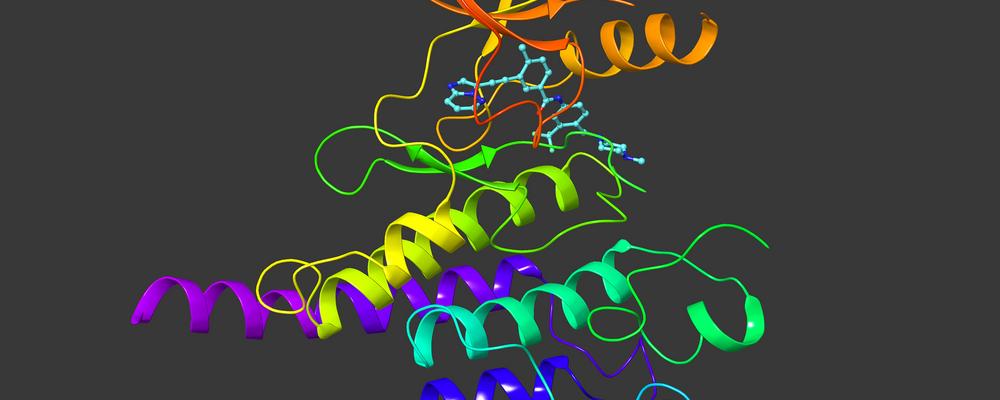
Organic and Medicinal Chemistry
Our research groups in organic and medicinal chemistry study the synthesis and use of organic molecules. Our research contributes to the development of new socially relevant applications, mainly in the field of material chemistry and life sciences.
Internationally recognized expertise
- Bioconjugation
- Biomedical photonics
- Dermatochemistry
- Materials chemistry
- Medicinal chemistry
- Natural product chemistry
- Organic synthesis
- Peptide chemistry
- Photochemistry
- Spectroscopy.
National and international collaborations
Our researchers have strong interdisciplinary collaborations within the University of Gothenburg, with Chalmers University of Technology and with the pharmaceutical industry, both locally and internationally. Collaboration projects focus on areas such as metabolic and neurodegenerative diseases, anti-infectives, cancer, skin allergy, material-chemical issues as well as cellular and molecular imaging techniques.
Publications and research grants
Our research groups publish in high impact journals such as Nature Communications, Angewandte Chemie, Journal of the American Chemical Society, Chemical Science, Nano Letters and Journal of Medical Chemistry. Several of our researchers have been awarded prestigious prizes and grants from, among others, the European Research Council.
Research groups
Anna Börje, Senior Lecturer in Chemistry
Dermatochemistry research aims to understand the chemical mechanisms behind contact allergy. Of particular interest are the mechanisms of photo contact allergy that is light induced.
Read more

Karl Börjesson, Professor of Physical Chemistry
Karl Börjesson's research goal is to tame organic molecules. His group uses optical spectroscopy in order to learn how to channel the energy of excited states towards a predetermined direction.

Marica Ericson, Professor of Physical Chemistry
Biomedical photonics research focuses on biomedical applications related to the interaction between light and matter. Of particular interest is multiphoton microscopy using femtosecond pulsed near infrared light.

Morten Grötli, Professor of Medicinal Chemistry
Development of enzyme inhibitors and their use as experimental tools for visualization and selective perturbation of biological processes in vivo and in vitro.
Read more

Göran Hilmersson, Professor
Read more

Philipp Klahn, Senior Lecturer in Medicinal Chemistry and Chemical Biology
Inspired by nature’s design, Philipp Klahn’s research focuses on the synthesis of bioactive molecules and drugs, with a special interest for the development of extra-cellular targeted drug conjugates, bioresponsive tool compounds and smart fluorophores.

Kristina Luthman, Professor Emerita of Medicinal Chemistry
Kristina Luthman's research has for a long time been focused on the design, synthesis and use of peptidomimetics. At present, the development of modulators of enzymes in the sirtuin family is of special interest.
Read more
Thomas Olsson, Professor Emeritus in Organic and Medicinal Chemistry
Read more
Henrik Sundén, Professor of Organic Chemistry
Henrik Sundén's research is focused on finding new environmentally friendly methods to produce complex molecules from simple molecular components as well as on developing smart gel-like materials.

Alesia Tietze, Professor of Medicinal Chemistry
Alesia Tietze's research focuses on engineering of bioactive peptides, membrane proteins and peptide-based bioinspired materials.

Carl Johan Wallentin, Professor of Organic Chemistry
Carl Johan Wallentin's research centers on method development within catalysis as well as targeted synthesis of biological relevant compound classes.
Read more

Research for sustainable development
Our research in Organic and Medicinal Chemistry contributes to sustainable development in many different ways. Among others, we work with
Good Health and well-being
Several of our projects aim to develop new methods and new medicinal molecules to study cell biological and medical problems. This can be, for instance, new methods for diagnosis and treatment using light-activated molecules. The new tools can also be used for further research, for instance, to understand the physiological role of target proteins, a first step in the development of new medicines for better health.
Affordable and clean energy
With their basic research on organic molecules, our researchers want to understand how molecules work and interact when it comes to energy. In doing so, they want to contribute to the development of new energy-efficient and cleaner technologies in the future.
Our researchers are also working on developing new environmentally friendly and more energy efficient synthesis methods that contribute to the sustainable development of new materials with reduced energy requirements.